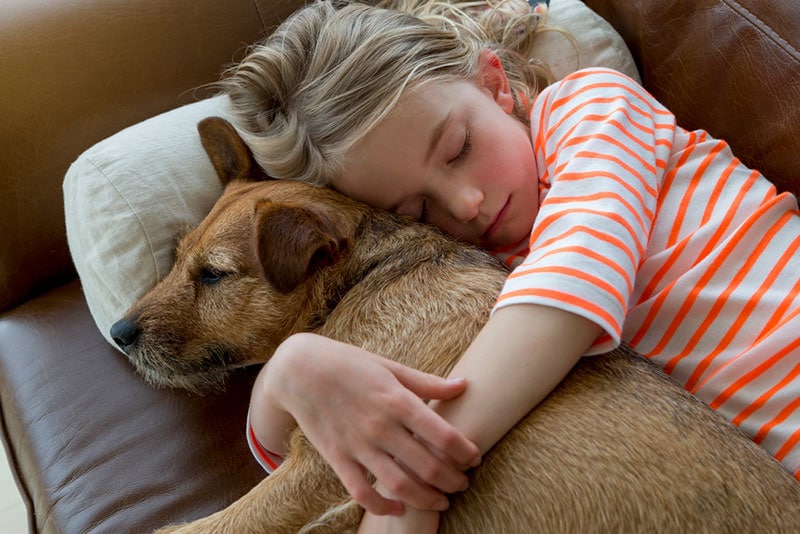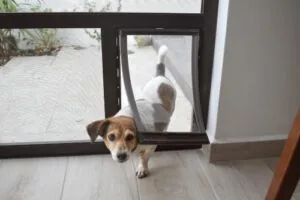Helping Children Cope With The Loss of a Beloved Pet

When an adult loses a beloved pet, grief is a normal reaction. The death of a cherished pet creates a sense of loss for adults and produces a predictable chain of emotions. The stages of grief are typically denial followed by sadness and depression, then gradually, relief or recovery. The effect of grief and loss on children is less predictable and depends upon the child’s age and maturity level. An individual child’s response to the death of the family pet depends on their ability to understand death and mortality. These are only suggestions for how to discuss losing a pet family member with your child.
The death of a pet may be the child’s first experience with death and loss. It can be a valuable opportunity to teach the child how to express grief in a healthy way. With all children, it is important to be as direct and honest as possible. Phrases such as “put to sleep” can be very frightening to younger children, who may develop a fear of going to sleep. Honesty is important when discussing the loss of a pet with any child. Stories such as the cat “ran away” or “went to live on a farm” may leave the child feeling abandoned or else believing that the pet will return some day. Although it may cause the child some initial pain, it is far better to tell the truth. Exactly what you should tell your child depends on the age of the child, their personality, and emotional maturity, the relationship that the child had with the cat and the reason that the pet died. Child development experts advise us that children may have “magical thinking”, believing that they are responsible for things that happen in their lives, including a pet’s illness or death, or that if they wish hard enough their pet will get better. If the pet is being euthanized, you should talk openly with your child about whether they want to be involved in the process. You should also allow the child to talk openly about death, so that you can understand it from the child’s point of view and provide reassurance as needed. Children may ask the same questions repeatedly. They also have fewer taboo subjects than many adults and may ask pointed questions that might seem morbid to adults. It is important that you act as a good role model; if you shield your child from the emotions that are part of your own reaction to grief, your child may feel that it is more ‘grown-up’ to hide and internalize their feelings. It is also important to tell other adults who play a significant role in the child’s life (a favorite relative, teacher, neighbor, or school counselor) about the pet loss, so that they can offer support in this difficult time.
Children who are two or three years old typically have no understanding of death or permanent loss. They often consider death as a form of sleep. Most psychologists agree that children should be told that their pet has died and will not return. The child may react by misbehaving, withdrawing or refusing to speak. The two or three year old should be reassured that the dog’s failure to return is unrelated to anything the child may have said or done. They should be told that this is a natural and expected event and that they were an important part of the pet’s life. Most children in this age range will accept a new pet with little fuss. Some children grasp the basic concept of death, but they often believe that the pet is physically living somewhere else, such as in the ground or the sky. In the child’s mind, the pet continues to eat, drink and play, or is ‘sleeping’ in this new place, and may still return home in the future. These beliefs may have been shaped by the child’s previous experience with death or loss of a family member and the explanation of that event offered by adults or other children. It is important to spend time exploring the child’s feelings and reassuring them that death and grief are a normal part of life. When discussing the child’s feelings, it is better to have several short informal talks rather than a long discussion. Some older children may become very curious about death and its implications. Parents should be ready to respond frankly and honestly to questions that may arise regarding mortality, either for the child or for others, including animals. Several manifestations of grief occur in these children and may include withdrawal, over-attentiveness, and “clingy” behavior. The child may develop problem behavior at school or home, showing learning difficulties, aggression, or imaginary health problems. Some children may initially act as if the loss of the pet is inconsequential but react with feelings of deep grief several weeks or months later. It is important that parents not dismiss the delayed feelings; the child should never be told that they “should be over that by now” or that “it happened so long ago, I’ve almost forgotten it”. Rather, the child needs support and reassurance that what they are feeling is normal and natural. Consequently, some children often react to death in a manner very similar to adults. Even though they appear to be reacting in an adult manner, they could be suffering and need just as much attention as a younger child would.
Young children usually cannot express their grief in words, mainly due to a lack of verbal skills. However, they can be encouraged to deal with their grief through drawings, play, or other activities such as planning a memorial for the pet. If you feel any age child needs additional help, it’s perfectly OK to seek outside assistance in a professional counselor.
For all age children, celebrate the fond memories and funny moments had with your pet. Have a couple of your favorite photos framed and place them alongside other family photos. When the time is right and you’re ready, it’s OK to introduce a new pet. Help your children understand that a new pet is in no way “replacing” their beloved pet that passed away, but rather is a new member of the family that you will love and care for just the same.
While the passing away of a beloved pet is difficult for everyone, there are valuable life lessons that your children can learn about life — happiness, sadness, grief and fond remembrances.
Share This Post
Recent Posts
About Shallowford Animal Hospital
Shallowford Animal Hospital and The Pet Spa at Shallowford are dedicated to the exceptional, compassionate care your pet deserves. Pets hold a very special place in our families, and we treat yours like our own.



